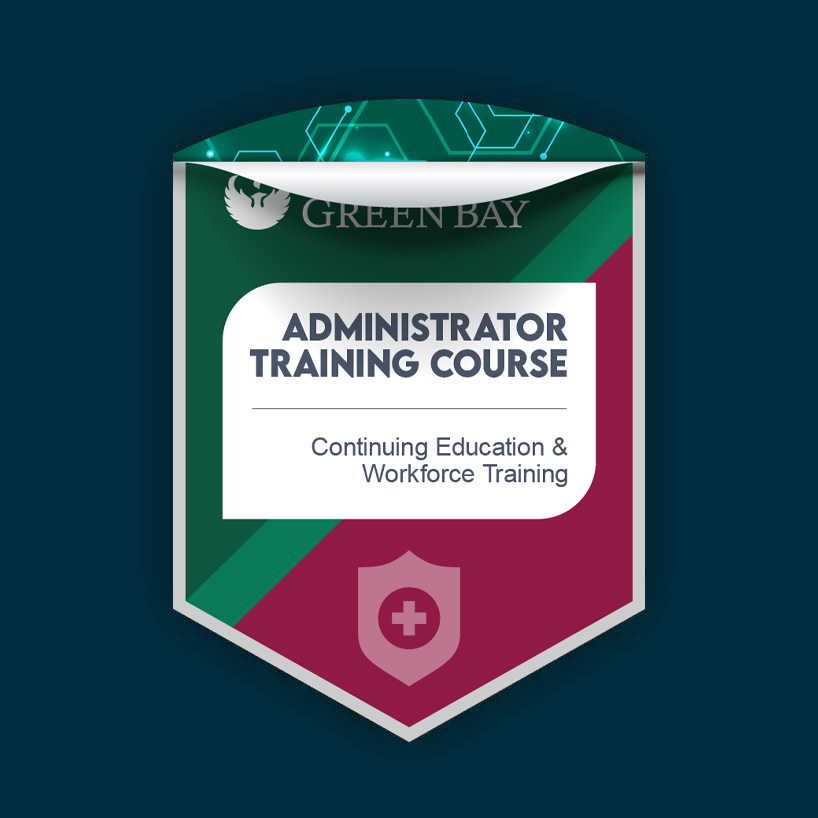DHS 83.15 Assisted Living Administrator's Training Course
Master the Art
Of Care
Qualify as an administrator with a purpose-driven curriculum.
We have created an approved training course for you to become an assisted living administrator if you have a bachelor's degree from an accredited college or university in a non-health-related field, DHS 83.15(1)(c), or if you have at least two years of experience working in healthcare with an identified client group, DHS 83.02(16).

Our Training Course at a Glance
This 60-hour instructor-led virtual course will cover the six required core competencies: Leadership Management Skills; Resident Care and Services; Resident Rights, Advocacy, Legal Issues; Physical Environment and Life Safety, Human Resources Management and Financial Management.
Dates
Your choice of February, May, September/October or November 2026
Format
Instructor-led Virtual Training (Zoom)
Investment
$2,000
Preparation
Prerequisites: If you are interested in becoming an administrator, you must complete the following prerequisites prior to taking this training course.
- Fire Safety $200
- First Aid and Choking $200
- Medication Administration $300
- Standard Precautions $150
- Assessment and Planning $79
- Licensing and Survey Process $129
If needed, you can sign-up for prerequisite courses when registering for the administrator's training course at an additional charge. It is your responsibility to ensure you have completed all prerequisites before the training course.
Exceptions: There are some accepted exemptions for the above course prerequisites. These exemptions will be explained when you register. Please check any and all exemptions that might apply to you.

Be a Stand Out Candidate
Upon successful completion of the certificate, you will receive an exclusive UW-Green Bay credential, a digital badge validating your accomplishment and signaling to employers your mastery of the curriculum. The digital badge can be featured on LinkedIn, your resume, email signature and website.
Training Course
The training course will be offered during two consecutive weeks Monday-Thursday, 8 a.m.-4:30 p.m. You may use the same login credentials to register if you already have a login for our Certified Direct Care Professional (CDCP) training program or as a Registry instructor. Not a registered user? New users will create an account. Register for the training course.
Your choice of dates:
- February 9-19, 2026
- May 4-14, 2026
- September 21-October 1, 2026
- November 2-12, 2026
While this course is delivered online, it’s purposefully crafted to match—and even exceed—the engagement, connection and impact of an in-person experience. Through dynamic discussions, hands-on applications and meaningful collaboration, participants will gain practical insights and transformative skills that can be immediately applied in real-world settings.
Leadership & Management
Learning objectives:
- Gain skills and learn best practices for becoming an effective leader.
- Learn how to build teams, delegate and effectively supervise staff.
- Understand licensure, regulations and the survey process and where and how to find regulations.
- Utilize business communication skills, both verbal and written.
- Implement customer service measures, quality assurance strategies and offer proper grievance procedures.
Resident Care & Services
Learning objectives:
- Understand the physical and psychosocial needs of your residents including state regulations.
- Be prepared to meet the food and nutritional needs of your residents.
- Provide infection control to CDC and Wisconsin Department of Health standards.
- Know the community and support services available for your residents.
- Understand nurse delegation and practices for administering and managing resident medications.
- Review the assessment, residency and discharge requirements.
- Be prepared to provide all necessary program services for your residents.
- Know how to communicate with external health and social service providers.
Resident Rights, Advocacy, Legal Issues
Learning objectives:
- Understand resident rights and your role in advocating for the residents in your community.
- Know how to handle grievances appropriately.
- Know what resources are available for residents, families, and the community employees to assist with resident rights advocacy and how to utilize them.
- Understand the different types of surrogate decision makers and their role in the resident’s care.
- Can conduct a thorough investigation, prevent, and protect residents from abuse, neglect, misappropriation and financial exploitation and report to DQA as necessary.
Physical Environment & Life Safety
Learning objectives:
- Learn to foster a safe, clean, and home-like environment.
- Be prepared for an emergency or disaster and create a plan.
- Understand your responsibility to Fire Safety.
- Become knowledgeable about the physical plant and building system requirements of a CBRF.
- Become familiar with the regulatory environments governing assisted living facilities.
Human Resources Management
Learning objectives:
- Recruit and interview staff.
- Hire staff and maintain personnel records.
- Develop and implement an orientation and training program for new hires and continuing education.
- Create a schedule and determine appropriate staffing levels.
- Write effective job descriptions.
- Adhere to payroll standards and labor laws.
- Be able to evaluate staff performance and discuss disciplinary action.
- Terminate an employee.
- Be able to conduct an investigation.
- Understand workers compensation insurance and liabilities.
Financial Management
Learning objectives:
- Understand how marketing is important to CBRF operations.
- Learn about basic marketing frameworks and be able apply to your marketing approaches.
- Understand funding sources of CBRFs.
- Learn about CBRFs fees/rates, including setting and negotiating them.
- Become familiar with basic bookkeeping and accounting principles that may be applicable to your role.
- Understand fraud and ethics.
How to Register
You may use the same login credentials to register if you already have a login for our Certified Direct Care Professional (CDCP) training program or as a Registry instructor. Not a registered user? New users will create an account.
Hear from Recent Graduates
Graduates share how the course deepened their insight and significantly enhanced their effectiveness as administrators.

Lisa Jamila-Wuerth
Assistant Director of Community Day Programs
Down Syndrome Association of Wisconsin
"The course was taught by several very experienced and well-informed instructors, and the material was presented in a very understandable way. Instructors covered all of the relevant material, kept the class participants engaged, encouraged participant input and were prepared to address specific situations brought up by participants. After completing this course, I now know all of the important information I need to know as an administrator, and where to look whenever I need to access or find this important information. I would highly recommend this course."

Jamison Toepel
Executive Director
Renaissance Senior Living of Hilldale
"I attended the course in January of 2025. It was very well designed to get the most out of the time. The instructor was extremely knowledgeable in the category and was able to actively engage with the other students. I would highly recommend the university for any future educational needs."

Have Questions?
We can help. Please don't hesitate to reach out to Sam Anderson, Program Coordinator.